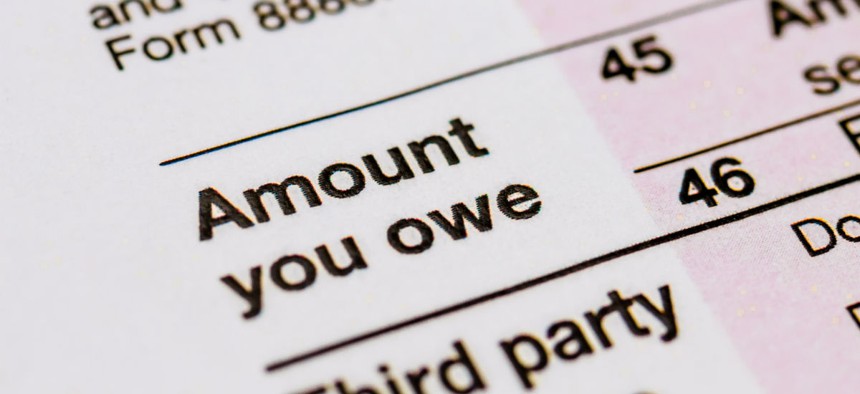
Teri Virbickis / Shutterstock.com
Bid to Privatize IRS Debt Collection Could Further Delay Highway Bill
NTEU and some Democrats rev up resistance while also opposing rerouting of customs fees.
Foreshadowing the budget battles likely between now and December’s deadline for revised spending bills, lawmakers are considering two controversial add-ons to the stalled highway trust fund bill. One would revive an experiment in privatizing collection of overdue taxes and the other would re-route revenues from customs fees.
Both were strongly opposed on Tuesday by a group of Democratic House members and Tony Reardon, the new national president of the National Treasury Employees Union, which fears job losses and further budget pressures on the Internal Revenue Service and Customs and Border Protection.
Language inserted by the Senate in July in a highway bill coming soon to the House floor, said, “In contracting for the services of any person under this section, the [Treasury] secretary shall utilize private collection contractors and debt collection centers.” A separate provision would move to highway spending funds from the Homeland Security Department’s Customs User Fee Account that traditionally have been used for CBP agency expenses.
“Given the current economic climate, it is more important for taxpayers to deal directly with IRS,” something that private collection agencies can’t do, Reardon told reporters.
Citing backing from the National Taxpayer Advocate and an array of nonprofits such as the NAACP and the National Consumer Law Center, NTEU said privatization of uncollected taxes has been tried twice in the past 20 years. “In the mid-1990s, it lost $17 million, and in 2006-2009, it lost $4.5 million” and generated consumer complaints to the Federal Trade Commission, Reardon said. It cost money to set up and IRS employees were pulled off other work, he said.
NTEU officials said lawmakers who favor privatization were “keeping their fingerprints off” the bill as it proceeds through the House Rules Committee. But Sen. Chuck Schumer, D-N.Y., has long been a defender of the approach as a way to close the tax gap, having introduced a bill as recently as May 2014.
In 2010, Schumer decried the IRS’ move to terminate the private debt collection program. “The bottom line is that this decision was made prematurely and without sufficient information," Schumer said in a release. One of the private collectors, Pioneer Credit Recovery, “is a prime economic bright spot in western New York and they need the time to show they can do the job right. It makes no sense to attempt to shut down this program without allowing it to operate at full capacity.”
Also defending privatization more recently is the debt collection industry. In an Oct. 20 op-ed published in The Hill, Stephanie Eidelman, CEO and publisher of insideARM.com, argued that the previous private debt collection experiment in just two years “collected $98 million in gross tax payments. This is $98 million more than the IRS would have collected on its own because it wouldn’t have otherwise pursued these accounts, and hasn’t since that time.”
Eleven House Democrats on Tuesday, led by Ways and Means Committee members John Lewis, D-Ga., and Sander Levin, D-Mich., released a statement calling for other ways to fund the highway bill. “It is misguided and harmful to taxpayers to use private debt collectors to collect outstanding tax liabilities,” they said. “When the IRS most recently used private debt collectors in 2006, the program actually lost money. After hearing numerous complaints from a wide variety of taxpayers, many of whom were subjected to harassment and other inappropriate collection techniques, this costly program was terminated.”
Early last month, 14 senators (all Democrats, plus Sen. Bernie Sanders, I-Vt.), wrote to House and Senate leaders opposing privatization, expressing skepticism that the estimated $2.5 billion in savings was realistic and warning that low-income taxpayers will be targeted.
The proposal to divert customs fee revenue to highway funding was negotiated in July by Senate Majority Leader Mitch McConnell, R-Ky., and Sens. Jim Inhofe, R-Okla., and Barbara Boxer, D-Calif. They said the agreement "reverses the trend of short-term, temporary fixes to fund the nation’s transportation network.”
NTEU’s Reardon argued that Customs and Border Protection could use the fee revenues to hire 2,700 officers, offering support for a proposal by Rep. Levin to index those fees for inflation. On Tuesday, four Democrats on the appropriations and Ways and Means panels filed an amendment to substitute the inflation adjustment for the plan to divert the fees. “The highway bill passed in the Senate breaks the long-standing precedent that funds created by the payment of customs user fees be used to pay for Customs-related expenses,” said Levin, joined by Reps. Lucille Roybal-Allard, D-Calif.; Bennie Thompson, D-Miss.; and Jim McDermott, D-Wash.
“Frustratingly, this break in precedent comes at a time when there is a staffing shortage of 1,811 Customs officers across the U.S.,” the lawmakers said. “The funds generated by indexing customs user fees to inflation are desperately needed to ensure that our nation’s border is secure, mitigate long wait times at our border for both trade and travel, and ensure that the United States is in compliance with its international obligations.”
(Image via Teri Virbickis / Shutterstock.com)
NEXT STORY: Congress Dares to Tweak Obamacare







